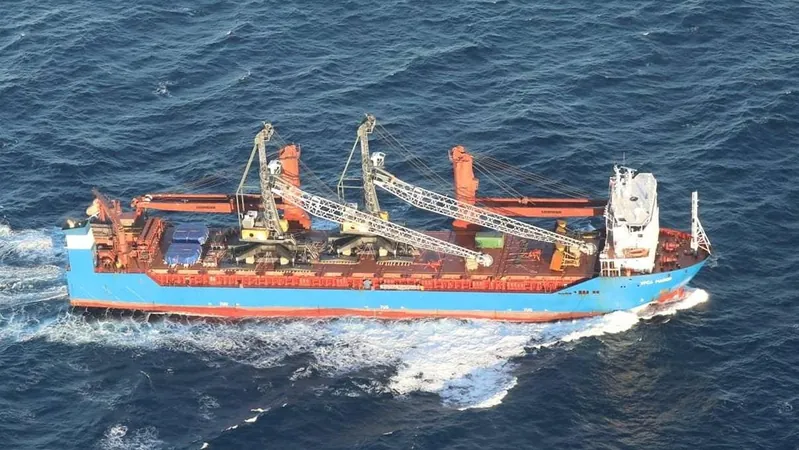
Catastrophic Loss: Russia's M/V Ursa Major Sinks, Disrupting Arctic Sea Trade and Military Logistics
2024-12-24
Author: Wai
Incident Overview
In a shocking incident on Christmas Eve, Russia's military logistics company faced a significant setback as its unique sealift vessel, the M/V Ursa Major, sank in the Mediterranean Sea near Spain. This 13,000-ton ship, which was only 15 years old, was deemed irreplaceable and its loss poses serious implications for both the Kremlin’s logistics operations and the beleaguered Russian shipbuilding sector.
Details of the Sinking
The Ursa Major, constructed in Germany, suffered a significant failure described by the Russian Crisis Management Center as a “blast” in her engine room while en route from Saint Petersburg to Vladivostok. Eyewitness reports indicated that the ship was seen listing dangerously to the starboard side before ultimately succumbing to the sea. Fortunately, rescue operations were swift, successfully saving 14 of the 16 crew members. However, the identities and fates of the two crew members who remain unaccounted for evoke concern.
Operational Significance of Ursa Major
This vessel was not just another cargo ship; it was the largest in the Oboronlogistika fleet and one of the few with roll-on/roll-off (RO/RO) capabilities that enabled vehicles to be loaded and unloaded directly. It was also equipped with top-mounted cranes, making it an essential asset for transferring heavy and oversized cargo. A disgruntled blogger noted the void left by Ursa Major, stating, “There simply isn’t a larger universal RO/RO-LO/LO-class cargo ship available.” This ship played a strategic role in logistics, particularly in support of Russian military operations, including those in the war-torn region of Syria.
Cargo and Route Details
At the time of her fateful journey, Ursa Major was reportedly carrying critical cargo, including heavy cranes and specialized hatches for nuclear-powered icebreakers, destined for Vladivostok. To mitigate the icy conditions of the Northern Sea Route in winter, the vessel opted for the southern passage through the Mediterranean, a decision that now carries serious ramifications. The additional weight of the equipment possibly contributed to the ship’s instability, making it top-heavy and more prone to capsizing.
Implications of the Sinking
Analysts are now pointing out the massive implications of Ursa Major's sinking: crucial state objectives for developing port infrastructure and enhancing operations along the Northern Sea Route are now jeopardized. This unexpected disruption may hinder Russia’s ambitions in the Arctic and impede supply lines essential for military and logistical efficiency.
Future Outlook and Maritime Risks
As concerns mount over the immediate futures of both Russian trade routes and military objectives in the region, the sinking of the Ursa Major serves as a stark reminder of the vulnerabilities and risks inherent in maritime logistics—especially in challenging conditions. The effects of this incident will likely resonate through both the military and commercial sectors for years to come, reshaping maritime strategies moving forward. Will Russia find a way to recover from this blow, or is this the beginning of deeper troubles for its Arctic ambitions? Stay tuned as we uncover more on this evolving situation!




 Brasil (PT)
Brasil (PT)
 Canada (EN)
Canada (EN)
 Chile (ES)
Chile (ES)
 España (ES)
España (ES)
 France (FR)
France (FR)
 Hong Kong (EN)
Hong Kong (EN)
 Italia (IT)
Italia (IT)
 日本 (JA)
日本 (JA)
 Magyarország (HU)
Magyarország (HU)
 Norge (NO)
Norge (NO)
 Polska (PL)
Polska (PL)
 Schweiz (DE)
Schweiz (DE)
 Singapore (EN)
Singapore (EN)
 Sverige (SV)
Sverige (SV)
 Suomi (FI)
Suomi (FI)
 Türkiye (TR)
Türkiye (TR)